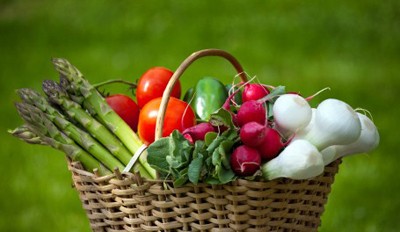
If the size of your garden is limited, you can still produce a surprising amount of food just by employing a few intensive gardening techniques. Here are 6 simple ways to help you produce a maximum yields in a minimum amount of space.
Straight, single crop rows may be the traditional way to plant vegetables, but it's certainly not the most efficient use of space. That's because a lot of extra space that could be used for growing crops ends up being devoted to walkways. Planting "beds" of crops is a much more efficient approach. Crops can be grown several rows wide (as wide as you can comfortably reach) before stopping to leave space for a path.
You can add even more space to your planting area just by creating a gentle 1 foot mound (arc) over the top of each bed (rather than leaving it flat). This gives a bed that is 4 feet wide at the base an extra foot of elevated growing space in the middle. Over the length of your beds, this small gain in extra space can really start to add up.
Once the space under your feet is filled with plants, it's time to start looking up. Although often overlooked, utilizing window boxes and hanging baskets are two simple ways to increase the size of your vegetables garden. Do you have a sunny wall on the side of a building or a fence railing that could accommodate a window box? How about space along the eaves for some hanging baskets? Window boxes work well for small vegetables such as radishes, chives, beets, or salad greens. Hanging baskets can hold strawberries, compact varieties of cucumber and tomatoes, and vining vegetables like peas and beans.
When planted within close proximity to each other, certain combinations of vegetables are thought to work together to produce a higher yield. For example, it is said that by interplanting onions with carrots, each helps the other ward off certain pests. Although the subject of companion planting is somewhat controversial (meaning there is little scientific evidence to support it), many experienced gardeners swear that it works.
Succession planting includes a number of intensive gardening techniques that make maximum use of both space and timing. In one method, after harvesting a first crop you quickly sow another one in the same space. For example, a cool season spring crop could be followed by a heat-loving summer crop, and then a cool season fall crop. In another method, you sow the same crop, but stagger their planting dates by a few weeks. Or, you plant different varieties of the same crop that have slightly different maturity dates. This strategy keeps empty garden spaces filled with growing crops, and is a great way to maintain a steady harvest throughout the season.
When you grow one type of crop in the same space every year, you increase the likelihood that certain insects and disease pathogens will become established in that area. Not only will rotating crops help prevent this, but it will also help to ensure the most efficient use of available nutrients. For example, by rotating legumes (nitrogen fixers) with other crops, you'll reduce amount of fertilizer you need.

About The Author: Ellen Brown is an environmental writer and photographer and the owner of Sustainable Media, an environmental media company that specializes in helping businesses and organizations promote eco-friendly products and services. Contact her on the web at http://www.sustainable-media.com
Add your voice! Click below to comment. ThriftyFun is powered by your wisdom!
Great tips...but don't forget the herb garden. This cn be added in almost any garden plan-- don't need much room.
Add your voice! Click below to comment. ThriftyFun is powered by your wisdom!